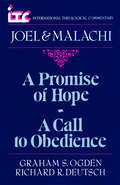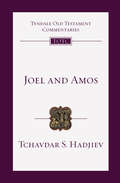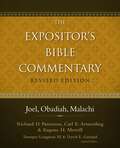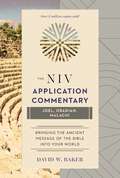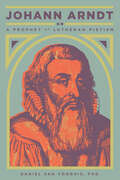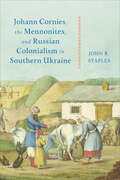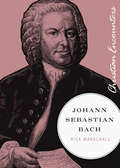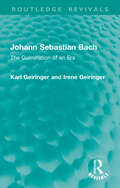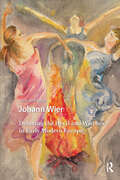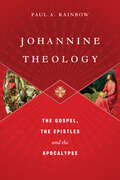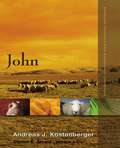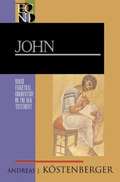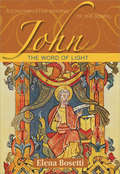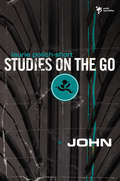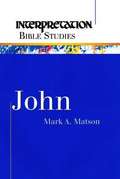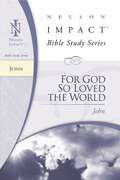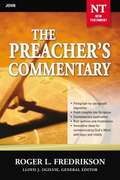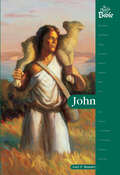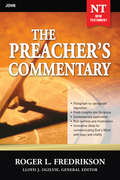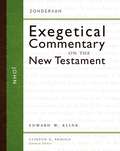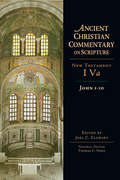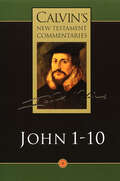- Table View
- List View
Joel & Malachi: A Promise of Hope (International Theological Commentary (ITC))
by Graham S. OgdenThe book of Joel is one of the Old Testament prophetic books, but it also has a clear and close association with lament literature. Graham Ogden takes seriously the book's lament setting, exegeting it entirely from within that framework. In his commentary on the book of Malachi, Richard Deutsch examines the religious, moral, and social aspects of the early postexilic Jewish community that the prophet was addressing in this brief book.
Joel and Amos: An Introduction and Commentary (Tyndale Old Testament Commentaries)
by Tchavdar S. HadjievJoel's arresting imagery—blasting trumpet, darkened sun, and marching hosts—has shaped the church's eschatological vision of a day of wrath. Amos's ringing indictments—callous oppression, heartless worship, and self-seeking gain—have periodically awakened the conscience of God's people. Twenty-five-hundred years later, those prophetic words still speak powerfully. This Tyndale commentary by Tchavdar Hadjiev on the books of Joel and Amos examines their literary features, historical context, theology, and ethics. The Tyndale Commentaries are designed to help the reader of the Bible understand what the text says and what it means. The Introduction to each book gives a concise but thorough treatment of its authorship, date, original setting, and purpose. Following a structural Analysis, the Commentary takes the book section by section, drawing out its main themes, and also comments on individual verses and problems of interpretation. Additional Notes provide fuller discussion of particular difficulties. In the new Old Testament volumes, the commentary on each section of the text is structured under three headings: Context, Comment, and Meaning. The goal is to explain the true meaning of the Bible and make its message plain.
Joel, Obadiah, Malachi (The Expositor's Bible Commentary)
by Tremper Longman III David E. Garland Eugene H. Merrill Richard D. Patterson Carl E. ArmerdingContinuing a Gold Medallion Award-winning legacy, this completely revised edition of The Expositor’s Bible Commentary series puts world-class biblical scholarship in your hands. Based on the original twelve-volume set that has become a staple in college and seminary libraries and pastors’ studies worldwide, this new thirteen-volume edition marshals the most current evangelical scholarship and resources. The thoroughly revised features consist of: • Comprehensive introductions • Short and precise bibliographies • Detailed outlines • Insightful expositions of passages and verses • Overviews of sections of Scripture to illuminate the big picture • Occasional reflections to give more detail on important issues • Notes on textual questions and special problems, placed close to the texts in question • Transliterations and translations of Hebrew and Greek words, enabling readers to understand even the more technical notes • A balanced and respectful approach toward marked differences of opinion
Joel, Obadiah, Malachi: Joel, Obadiah, Malachi (The NIV Application Commentary)
by David W. BakerThe NIV Application Commentary helps you communicate and apply biblical text effectively in today's context.To bring the ancient messages of the Bible into today's world, each passage is treated in three sections:Original Meaning. Concise exegesis to help readers understand the original meaning of the biblical text in its historical, literary, and cultural context.Bridging Contexts. A bridge between the world of the Bible and the world of today, built by discerning what is timeless in the timely pages of the Bible.Contemporary Significance. This section identifies comparable situations to those faced in the Bible and explores relevant application of the biblical messages. The author alerts the readers of problems they may encounter when seeking to apply the passage and helps them think through the issues involved.This unique, award-winning commentary is the ideal resource for today's preachers, teachers, and serious students of the Bible, giving them the tools, ideas, and insights they need to communicate God's Word with the same powerful impact it had when it was first written.
Joey: How a Blind Rescue Horse Helped Others Learn to See
by Jennifer Marshall BleakleyThe heartwarming true story of a blind horse named Joey. <p><p>At the height of his show career, this beautiful Appaloosa’s majestic stature, strength, and willingness to work made him the perfect partner. But when an injury cost Joey his show career, he moved from one owner to the next, ultimately experiencing severe abuse and neglect. A rescue group found Joey nearly dead from starvation―and blind. <p><p> Then he came to Hope Reins―a ranch dedicated to helping hurting kids who had been abused, emotionally wounded, or unwanted. By teaching these children to care for rescued animals, the Hope Reins staff were convinced they could reach kids with love and hope and show them that we are never forgotten by God. <p><p> But could the financially struggling ranch afford to take care of a blind horse that no one else wanted? Could Joey somehow learn to trust people even though the world had hurt him so badly? And what would happen―to Joey, the kids, and Hope Reins―if they failed? <p><p> A true story of friendship destined to become a classic, Joey will touch your heart and reveal the power of finding light in the darkness.
Johann Arndt: A Prophet of Lutheran Pietism
by Daniel Van VoorhisThis is the story of the most significant devotional author of the seventeenth century in his first full English language biography. Using previously unknown letters as a few of the resources, this story aims to recreate the theological, sometimes magical, and social worlds of Johann Arndt. Arndt was regarded by his peers and successive generations as either the most significant Reformer since Luther, or an uneducated and dangerous element within the Lutheran church. Later commentators have given Arndt the credit, or blame, for the founding of the Pietist movement. Arndt was a central figure in the forging of various Lutheran "orthodoxies" of the early seventeenth century and thus the first generation to attempt an interpretation of the Lutheran Confessions of Faith. He is challenged by some on the conservative right for his mystical influences, but was a hero to orthodox Lutheran Johann Gerhard. He did more than found the pietist tradition (which he actually may or may not have); he also became the father of a Lutheran spiritual, maybe mystical tradition. While this movement would only last in more extreme forms of the Lutheran church, the argument from Arndt, Gerhard, and others was that this tradition was not in conflict with the teachings of the Lutheran Confessions. It's a movement that almost was, and lives on in whispers in the church today.
Johann Cornies, the Mennonites, and Russian Colonialism in Southern Ukraine (Tsarist and Soviet Mennonite Studies)
by John R. StaplesIn the late eighteenth century, the Russian Empire opened the grasslands of southern Ukraine to agricultural settlement by new colonists, among them Prussian Mennonites. Mennonite colonization was one aspect of the empire’s consolidation and modernization of its multi-ethnic territory. In the colony of Molochnaia, the dominant personality of the early nineteenth century was Johann Cornies (1789–1848), a hard-driving modernizer and intimate of senior Russian officials whose papers provide unique access into events in Ukraine in this era. Johann Cornies, the Mennonites, and Russian Colonialism in Southern Ukraine uses the life story of Johann Cornies to explore how colonial subjects interacted with Russian imperial policy. The book reveals how tsarist imperial policy shifted toward Russification in the 1830s and 1840s and became increasingly intolerant of ethnocultural and ethnoreligious minorities. It shows that Russia employed the Mennonite settlement as a colonial laboratory of modernity, and that the Mennonites were among Russia’s most economically productive subjects. This microhistory illuminates the role of Johann Cornies as a mediator between the empire and the Mennonite colonists, and it ultimately aims to bring light to the history of nineteenth-century Russia and Ukraine.
Johann Sebastian Bach
by Rick MarschallTwo-and-a-half centuries after his death, the complex life of composer Johann Sebastian Bach continues to fascinate. Bach's colorful life was anchored in his belief that "music has been ordered by God's Spirit"?so much so that he began each composition by scrawling Jesu, juva (Jesus, help me) at the top of a blank page and concluded each with S.D.G. (short for Soli Deo Gloria, to God alone be the glory). Through the eyes of noted music and culture writer Rick Marschall, the intensely personal yet boldly public faith that earned Bach the nickname "The Fifth Evangelist" takes on fresh meaning. From a survey of Bach's family and its deep Christian roots to a behind-the-scenes look at how he crafted his masterpieces, this book paints a picture of an astonishing figure and his relationship with his God.Marschall brings Bach's enduring music and influence to the postmodern world and to all who would draw inspiration from his relentless pursuit of divinely ordained creativity.
Johann Sebastian Bach: The Culmination of an Era (Routledge Revivals)
by Karl Geiringer Irene GeiringerWhen it was originally published in 1967, this study of J.S. Bach was the first important work on the composer in nearly a generation. The many discoveries about Bach’s life and music that occurred in the postwar years created the need for a new interpretative study incorporating this research and this was the only book which incorporated the vast amount of material uncovered since 1950, the bicentennial of Bach’s death. The volume begins with a brief biography and is followed by an analysis of each major type of composition: vocal, organ, keyboard and instrumental music. In each section the author examines thoroughly many Bach compositions and evaluates them in relation to the rest of the composer’s work, as well as in relation to the music of his contemporaries. More than 70 music examples enable the reader to understand how Bach worked, the manner in which his genius developed and grew, and to see outstanding excerpts from his music in various stages of completion. An interesting aspect of research methods is revealed through an explanation of the detective work which has been done regarding handwriting, paper and watermarks in the original sources.
Johann Wier: Debating the Devil and Witches in Early Modern Europe (Renaissance History, Art and Culture)
by Michaela ValenteThis book deals with a fascinating and original claim in 16th-century Europe. Witches should be cured, not executed. It was the physician and scholar Johann Wier (1515-1588) who challenged the dominant idea. For his defense of witches, more than three centuries later, Sigmund Freud chose to put Wier's work among the ten books to be read. According to Wier, Satan seduced witches, thus they did not deserve to be executed, but they must be cured for their melancholy. When the witch hunt was rising, Wier was the first to use some of the arguments adopted in the emerging debate on religious tolerance in defence of witches. This is the first overall study of Wier which offers an innovative view of his thought, by highlighting Wier's sources and his attempts to involve theologians, physicians, and philosophers in his fight against cruel witch hunts. Johann Wier: Debating the Devil and Witches situates and explains his claim as a result of a moral and religious path as well as the outcome of his medical experience. The book aims to provide an insightful examination of Wier's works to read his pleas emphasizing the duty of every good Christian to not abandon anyone who strays from the flock of Christ. For these reasons, Wier was overwhelmed by bitter confutations, such as those of Jean Bodin, but he was also celebrated for his outstanding and prolific heritage for debating religious tolerance.
Johanna's Bridegroom
by Emma MillerWill You Marry Me?Bold widow Johanna Yoder stuns Roland Byler when she asks him to be her husband. To Johanna, it seems very sensible that they marry. She has two children, and he has a son. Why shouldn't their families become one? But the widower has never forgotten his long-ago love for her; it was his foolish mistake that split them apart. This could be a fresh start for both of them. Until she reveals she wants a marriage of convenience only. It's up to Roland to woo the stubborn Johanna and convince her to accept him as her groom in her home and in her heart.
Johanna's Bridegroom and Plain Protector
by Emma Miller Alison StoneTwo Amish stories of faith and love Johanna's Bridegroom by Emma Miller Johanna Yoder stuns Roland Byler when she asks him to be her husband-in a marriage of convenience. With both of them widowed single parents, why shouldn't their families become one? But Roland has never forgotten his long-ago love for her and he's determined to woo the stubborn Johanna and convince her to accept his offer of happily-ever-after. Plain Protector by Alison Stone Social worker Sarah Gardner doesn't want to run again, but when an unknown assailant attacks her shortly after moving to Apple Creek, she may not have a choice. Unless deputy sheriff Nick Jennings can protect her. Nick knows Sarah holds secrets that threaten both their lives, but he can't turn away a woman in peril...especially one he can't imagine a future without.
Johannine Theology: The Gospel, the Epistles and the Apocalypse
by Paul A. RainbowIn this magisterial synthesis, Paul A. Rainbow presents the most complete account of the theology of the Johannine corpus available today. Both critical and comprehensive, this volume includes all the books of the New Testament ascribed to John: the Gospel, the three epistles and the book of Revelation. While not proclaiming a definitive position on the question of authorship, this work seeks to shed light on the theology common to all the New Testament authors. John?s root beliefs concerning God, humanity, sin, the world, and the significance of the Christ-event on eschatology unite the examined books with the rest of the New Testament canon. The Johannine corpus also highlights the important areas of christology, soteriology and ecclesiology in a manner that is worth exploration. Organizing John's ideas by the main characters around whom they revolve, the Johannine universe consists of persons divine and human, and their relationships with each other. Father, Son, Holy Spirit, faithful believers and the rest of the world are the main cast of characters that make up the rich set of writings considered in this exhaustive analysis.
John
by Andreas J. Kostenberger Clinton E. ArnoldBrimming with lavish, full-color photos and graphics, the Zondervan Illustrated Bible Backgrounds Commentary walks you chapter by chapter through all the books of the New Testament. It’s like slipping on a set of glasses that lets you read the Bible through the eyes of a first-century reader! Discoveries await you that will snap the world of the New Testament into gripping immediacy. Things that seem mystifying, puzzling, or obscure will take on tremendous meaning when you view them in their ancient context. You’ll deepen your understanding of the teachings of Jesus. You’ll discover the close, sometimes startling interplay between God’s kingdom and the practical affairs of the church. Best of all, you’ll gain a deepened awareness of the Bible’s relevance for your life. <P><P>Written in a clear, engaging style, this beautiful commentary provides a new and accessible approach that more technical expository and exegetical commentaries don’t offer. It features: • Commentary based on relevant papyri, inscriptions, archaeological discoveries, and studies of Judaism, Roman culture, Hellenism, and other features of the world of the New Testament • Hundreds of full-color photographs, color illustrations, and line drawings • Copious maps, charts, and timelines • Sidebar articles and insights • “Reflections” on the Bible’s relevance for 21st-century living
John
by Andreas J. KöstenbergerAndreas J. Köstenberger's new commentary on the Gospel of John draws on extensive research and engages the best of contemporary scholarship, yet provides a readable study that will be beneficial to students, pastors, and scholars. After considering the historical context of the letter as well as its relation to other New Testament writings, Köstenberger turns to his exegetical work. An introduction to each exegetical unit is provided along with the author's own translation of the Greek text. In the course of his verse-by-verse comments, Köstenberger incorporates references to other ancient writings that help explain the book's theological, cultural, and social context. Where appropriate, he draws upon the work of other commentators and provides extensive notes for further reading and research.
John
by Elena BosettiWith insightful reflections, scripture scholar Elena Bosetti brings a prayerful, uniquely feminine, and deeply human perspective to God's word. This exploration of the Gospel launches us on a journey of encounter, discovery, conversion, and announcement of news so good that it must be shared.
John
by Laurie PolichCreative, engaging Bible study questions are hard to come by … without rewriting questions for yourself. Each book of questions leads a small group through a book (or combination of books) in the Bible—helping students become more biblically literate, and allowing them to come face-to-face with God’s Word. Students will be pushed, encouraged, and challenged by these studies. But more than all this, they will be changed. Each passage of Scripture sets the topic—and the questions are constructed to help students think deeply, talk openly, and apply what they are learning to their lives. Leaders will be able to pick it up and use it immediately with kids. Volunteers are looking for good “book of the Bible studies” they can pick up and use in their groups. Grab it and go, these studies will meet your students where they are and help them see how God’s Word can speak to their world.
John
by Mark A. MatsonIn this ten-session study, Mark Matson presents the Fourth Gospel. The Gospel of John is a very different book than the other three--there is no Sermon on the Mount or parables and there is no teaching of the Lord's Prayer. But what is important about John is the undertone of conflict between those who accepted Jesus as Messiah and those who did not. Interpretation Bible Studies (IBS) offers solid biblical content in a creative study format. Forged in the tradition of the celebrated Interpretation commentary series, IBS makes the same depth of biblical insight available in a dynamic, flexible, and user-friendly resource. Designed for adults and older youth, IBS can be used in small groups, in church school classes, in large group presentations, or in personal study.
John (Nelson Impact Bible Study Guide)
by ZondervanThe Nelson Impact Bible Study series will introduce in-depth Bible study to Christian laypeople. Each book will help readers experience the true meaning of the messages in the book of Genesis, and in turn, empower the reader to truly make a difference in the world for Christ. Designed for individual or group study, the study guide will provide a foundation for Bible study and encourage the reader to return to the Bible. All necessary background information will be given so that the reader needs only a Bible and the study guide. The messages will be thorough but easily understood and will be complimented by application questions to guide the readers into a deeper relationship with the Bible that will impact their lives with the gospel of Jesus Christ.Other study guides in the series include: 1 Corinthians ISBN: 1418506192 Exodus ISBN: 1418506168 Genesis ISBN: 1418506087 Isaiah ISBN: 1418506095 John ISBN: 1418506109 Mark ISBN: 1418506184 Romans ISBN: 1418506117 Ruth & Esther ISBN: 1418506176
John (Preacher's Commentary, Volume #27)
by Roger L. FredriksonGeneral editor Lloyd J. Ogilvie brings together a team of skilled and exceptional communicators to blend sound scholarship with life-related illustrations. The design for the Preacher's Commentary gives the reader an overall outline of each book of the Bible. Following the introduction, which reveals the author's approach and salient background on the book, each chapter of the commentary provides the Scripture to be exposited. The New King James Bible has been chosen for the Preacher's Commentary because it combines with integrity the beauty of language, underlying Hebrew and Greek textual basis, and thought-flow of the 1611 King James Version, while replacing obsolete verb forms and other archaisms with their everyday contemporary counterparts for greater readability. Reverence for God is preserved in the capitalization of all pronouns referring to the Father, Son, or Holy Spirit. Readers who are more comfortable with another translation can readily find the parallel passage by means of the chapter and verse reference at the end of each passage being exposited. The paragraphs of exposition combine fresh insights to the Scripture, application, rich illustrative material, and innovative ways of utilizing the vibrant truth for his or her own life and for the challenge of communicating it with vigor and vitality.
John (The People's Bible)
by Gary P BaumlerWho was John in the Bible? Who wrote the book of John?The apostle John refers to himself as the disciple “whom Jesus loved.” John was one of the inner circle of disciples, together with Peter and James—John’s brother. As he records the ministry of Jesus, the apostle adds many insights not recorded by the other gospels.The book of John in the Bible is a simple and clear statement of God’s grace in Christ, written so that readers like you and me might believe and have life in Jesus, God’s Son.Want to learn more? If you’re wondering what the book of John is all about, this helpful resource is for you!John is a reliable Bible commentary. It’s down to earth, clearly written, easy to read and understand, and filled with practical and modern applications to Scripture.It also includes the complete text of the book of John from the NIV Bible. The Christ-centered commentaries following the Scripture sections contain explanations of the text, historical background, illustrations, and archaeological information. John is a great resource for personal or group study!This book is a part of The People’s Bible series from Northwestern Publishing House.
John (The Preacher's Commentary)
by Roger FredriksonGeneral editor Lloyd J. Ogilvie brings together a team of skilled and exceptional communicators to blend sound scholarship with life-related illustrations.The design for the Preacher's Commentary gives the reader an overall outline of each book of the Bible. Following the introduction, which reveals the author's approach and salient background on the book, each chapter of the commentary provides the Scripture to be exposited. The New King James Bible has been chosen for the Preacher's Commentary because it combines with integrity the beauty of language, underlying Hebrew and Greek textual basis, and thought-flow of the 1611 King James Version, while replacing obsolete verb forms and other archaisms with their everyday contemporary counterparts for greater readability. Reverence for God is preserved in the capitalization of all pronouns referring to the Father, Son, or Holy Spirit. Readers who are more comfortable with another translation can readily find the parallel passage by means of the chapter and verse reference at the end of each passage being exposited. The paragraphs of exposition combine fresh insights to the Scripture, application, rich illustrative material, and innovative ways of utilizing the vibrant truth for his or her own life and for the challenge of communicating it with vigor and vitality.
John (Zondervan Exegetical Commentary on the New Testament)
by Edward W Klink IIIConcentrate on the biblical author's message as it unfolds.Designed to assist the pastor and Bible teacher in conveying the significance of God's Word, the Zondervan Exegetical Commentary on the New Testament series treats the literary context and structure of every passage of the New Testament book in the original Greek.With a unique layout designed to help you comprehend the form and flow of each passage, the ZECNT unpacks:The key message.The author's original translation.An exegetical outline.Verse-by-verse commentary.Theology in application.While primarily designed for those with a basic knowledge of biblical Greek, all who strive to understand and teach the New Testament will benefit from the depth, format, and scholarship of these volumes.
John 1-10 (Ancient Christian Commentary on Scripture #Nt Volume 4a)
by Thomas C. Oden Joel C. ElowskyHomilies on John,
John 1-10 (Calvin’s New Testament Commentaries (CNTC))
by John CalvinThis is a print on demand book and is therefore non- returnable. This volume is one of twelve classic commentaries by John Calvin, theologian par excellence of the Reformation, whose expositions of Scripture remain as relevant as ever. Edited by David W. Torrance and Thomas F. Torrance, these twelve commentaries on the New Testament bring Calvin's authoritative voice to life in clear contemporary English. The translations all strive to retain the close coherence of Calvin's ideas and characteristic images while remaining faithful to the Latin text — doing full justice to the Reformer's qualities as one of history's finest expositors of the Word of God.
